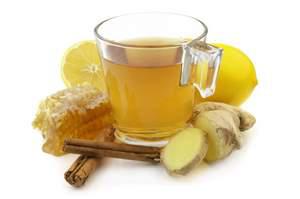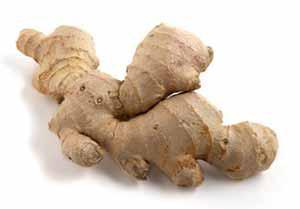Healthy is Sexy right? Ginger is a really great natural and delicious way to get there…
I have found a new love, I boil hot water, add some natural honey and about 4 slices of fresh ginger. It is absolutely amazing tasting. I decided to google the benefits of ginger and came up with this…

Ovarian Cancer Treatment
Ginger may be powerful weapon in the treatment of ovarian cancer. A study conducted at the University of Michigan Comprehensive Cancer Center found that ginger powder induces cell death in all ovarian cancer cells to which it was applied.
Colon Cancer Prevention
A study at the University of Minnesota found that ginger may slow the growth of colorectal cancer cells.
Morning Sickness
A review of several studies has concluded that ginger is just as effective as vitamin B6 in the treatment of morning sickness.
Motion Sickness Remedy
Ginger has been shown to be an effective remedy for the nausea associated with motion sickness.
Reduces Pain and Inflammation
One study showed that ginger has anti-inflammatory properties and is a powerful natural painkiller.
Heartburn Relief
Ginger has long been used as a natural heartburn remedy. It is most often taken in the form of tea for this purpose.
Cold and Flu Prevention and Treatment
Ginger has long been used as a natural treatment for colds and the flu. Many people also find ginger to be helpful in the case of stomach flus or food poisoning, which is not surprising given the positive effects ginger has upon the digestive tract.
Migraine Relief
Research has shown that ginger may provide migraine relief due to its ability to stop prostaglandins from causing pain and inflammation in blood vessels.
Menstrual Cramp Relief
In Chinese medicine, ginger tea with brown sugar is used in the treatment of menstrual cramps.
Prevention of Diabetic Nephropathy
A study done on diabetic rats found that those rats given ginger had a reduced incidence of diabetic nephropathy (kidney damage).
How to Take It:
Pediatric
Ginger should not be used by children under 2 years of age.
Ginger may be used by children over 2 years of age to treat nausea, digestive cramping, and headaches. Adjust the recommended adult dose to account for the child’s weight. Most herbal dosages for adults are calculated on the basis of a 150 lb (70 kg) adult. Therefore, if the child weighs 50 lb (20 – 25 kg), the appropriate dose of ginger for this child would be 1/3 of the adult dosage.
Adult
In general, ginger intake should not exceed 4 grams daily (this includes the ginger obtained through diet such as from ginger ale, ginger snaps, and ginger bread). Usually, food sources contain no more than 0.5% ginger.
Standardized dose: Take 75 – 2,000 mg in divided doses with food, standardized to contain 4% volatile oils or 5% total pungent compounds including 6-gingerol or 6-shogaol.
For nausea, gas, or indigestion: 2 – 4 grams of fresh root daily (0.25 – 1.0 g of powdered root) or 1.5 – 3.0 mL (30 – 90 drops) liquid extract daily. To prevent vomiting, take 1 gram of powdered ginger (1/2 tsp) or its equivalent, every 4 hours as needed (not to exceed 4 doses daily), or 2 ginger capsules (1 gram), 3 times daily. You may also chew a 1/4 oz piece of fresh ginger when needed.
For pregnancy-induced vomiting, use 250 mg 4 times daily.
To relieve arthritis pain: Take fresh ginger juice, extract, or tea, 2 – 4 grams daily. Topical ginger oil may also be rubbed into a painful joint. Fresh ginger root may also be placed in a warm poultice or compress and apply to painful areas.
For cold and flu symptoms, sore throat, headache and menstrual cramps: Steep 2 tbsp of freshly shredded ginger in hot water, 2 – 3 times daily. A drop of ginger oil or a few slices of fresh rhizome may also be placed in steaming water and inhaled.
Precautions:
The use of herbs is a time-honored approach to strengthening the body and treating disease. Herbs, however, contain components that can trigger side effects and interact with other herbs, supplements, or medications. For these reasons, herbs should be taken with care, under the supervision of a health care provider qualified in the field of botanical medicine.
Side effects associated with ginger are rare, but if taken in excessive doses the herb may cause mild heartburn, diarrhea and irritation of the mouth. Some of the mild gastrointestinal side effects, such as belching, heartburn, or stomach upset, may be relieved by taking ginger supplements in capsules.
People with gallstones should consult a doctor before taking ginger. Make sure to tell your doctor if you are taking ginger and will be undergoing surgery or placed under anesthesia for any reason.
Do not take ginger if you have a bleeding disorder or if you are taking blood-thinning medications, including aspirin.
Possible Interactions:
Ginger may alter the effects of some prescription and nonprescription medications. If you are currently being treated with any of the following medications, you should not use ginger without first talking to your health care provider.
Blood-thinning medications – Although ginger may interfere with blood clotting, there have been no scientific or case reports of interactions between ginger and blood-thinning medications, such as aspirin and warfarin. However, people taking medications that thin the blood should use ginger only under the supervision of a health care provider.
So there you have it…I will have to try it out for the different uses above, I get migraines and have lots of body aches, so I will let ya know if the results are noticable!!
Happy Sunday Folks :)


